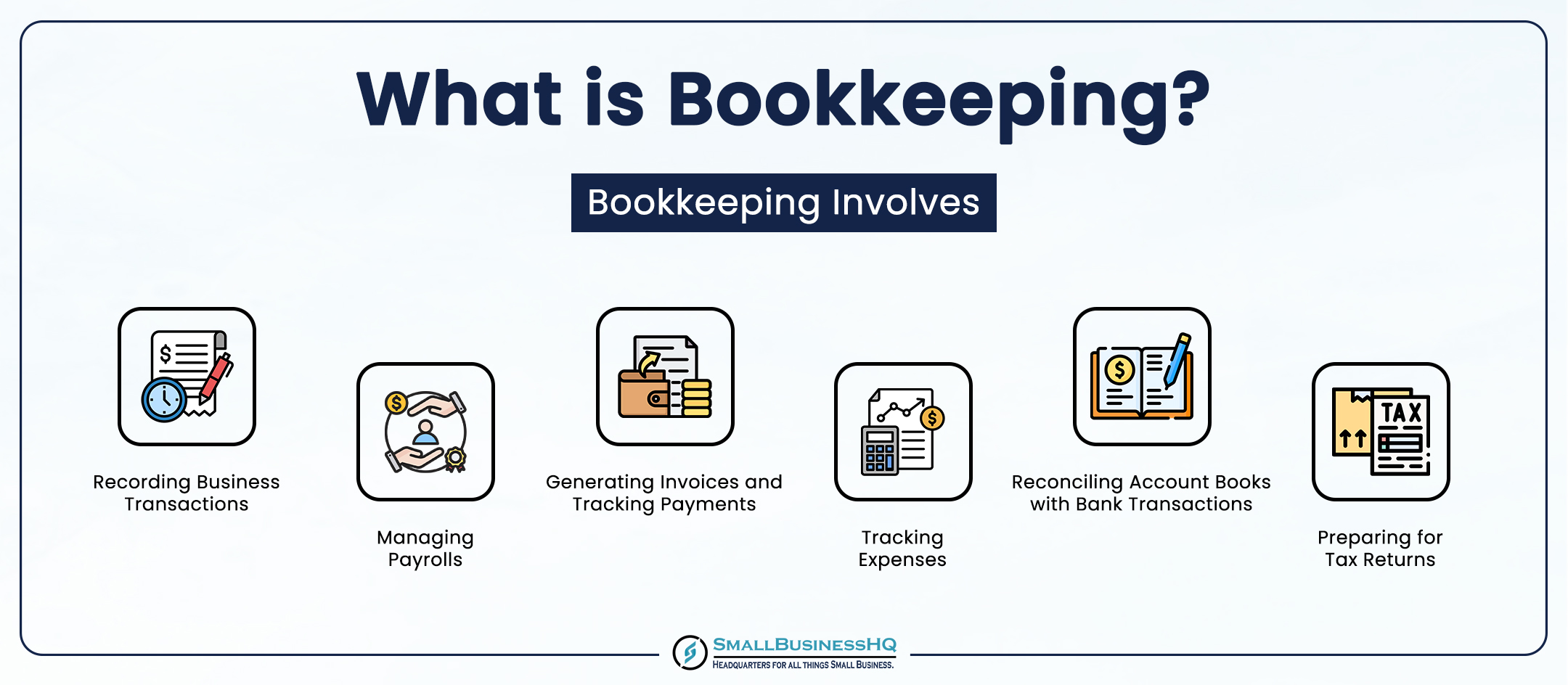Bookkeeping Services Calgary: what they include
Checking Out the Key Responsibilities of a Specialist Bookkeeper in Financing
The duty of an expert bookkeeper is fundamental in the domain name of financing. They are tasked with preserving accurate monetary records, taking care of accounts payable and receivable, and making sure conformity with monetary policies. Furthermore, their duty encompasses preparing monetary statements and reports. Each of these duties adds to the financial health and wellness of an organization. Nevertheless, the nuances of their work typically go undetected, questioning about the effect of their proficiency on broader monetary techniques.
Preserving Accurate Financial Records
Keeping accurate economic documents is an essential responsibility for professional accountants. This task needs careful interest to detail and an extensive understanding of monetary principles. Accountants are liable for documenting all financial purchases, making certain that information is tape-recorded regularly and precisely. They use different bookkeeping software application and devices to simplify the recording process, which improves performance and lowers the threat of mistakes.
Regular reconciliation of accounts is vital, enabling bookkeepers to identify disparities and correct them quickly. By maintaining organized and updated records, they provide valuable understandings into the monetary health and wellness of an organization. This responsibility additionally incorporates the prep work of monetary statements, which function as a substantial resource for monitoring decision-making. Eventually, the exact monetary documents maintained by bookkeepers support conformity with regulative requirements and foster depend on amongst stakeholders, consequently contributing to the general success of the business.

Taking Care Of Accounts Payable and Receivable
Successfully taking care of accounts payable and receivable is a crucial facet of a bookkeeper's duty, guaranteeing that a company's money flow remains healthy and balanced. This responsibility entails tracking outgoing and inbound settlements, which enables timely payment and collections from clients while likewise ensuring that the company meets its economic obligations to suppliers and suppliers.
Bookkeepers need to keep accurate records of billings, settlement terms, and due dates, facilitating efficient interaction with customers and lenders. By keeping an eye on these accounts, they can recognize inconsistencies or overdue accounts, enabling aggressive procedures to solve issues prior to they rise.
Additionally, an accountant's role includes resolving accounts to assure that all financial deals align with financial institution statements and internal documents. This persistance not only improves economic openness but also sustains calculated economic preparation, permitting the company to designate sources efficiently and maintain a robust financial setting.
Ensuring Conformity With Financial Laws
While guiding through the complex landscape of financial regulations, a bookkeeper plays an essential role in ensuring an organization complies with legal requirements and guidelines. This obligation consists of staying upgraded on adjustments in tax obligation legislations, compliance demands, and industry-specific regulations. Bookkeeping Services Calgary. By carefully tracking monetary transactions and keeping exact records, the bookkeeper helps prevent infractions that could bring about fines or legal issues
In addition, the accountant checks interior controls to guard against fraudulence and mismanagement. They carry out procedures that advertise openness and responsibility within the financial framework of the company. Cooperation with auditors and governing bodies better strengthens compliance efforts, as bookkeepers provide necessary documents and support during testimonials.
Eventually, the dedication to compliance not just secures the organization yet likewise boosts its trustworthiness with stakeholders, fostering trust fund and stability in its economic methods.
Readying Financial Statements and Information
Preparing economic statements and records is an important task for bookkeepers, as it provides stakeholders with a clear overview of a company's financial wellness. Best Bookkeeper Calgary. These records, which typically include the equilibrium sheet, income statement, and cash flow declaration, sum up the financial activities and placement of business over a details period. Bookkeepers carefully collect, record, and organize monetary information to assure precision and conformity with suitable audit criteria
The prep work process includes fixing up accounts, confirming transactions, and adjusting entrances as essential. Through this thorough strategy, accountants help ensure that monetary declarations mirror the true state of the organization's financial resources. In addition, prompt prep work of these records is vital for reliable decision-making by administration, financiers, and governing bodies. By offering exact and clear monetary paperwork, accountants play a crucial role in keeping openness and depend on within the economic ecosystem of the company.
Giving Financial Insights and Evaluation
Bookkeepers examine monetary data to offer beneficial insights that educate critical decision-making within a company. By diligently reviewing fads in revenue, expenses, and money flow, they aid recognize locations for renovation and emphasize prospective risks. Bookkeeper Calgary. These insights enable administration to allocate resources better and adjust service techniques as necessary

Additionally, by leveraging financial software and analytical tools, accountants can present information in a clear and understandable style, making it much easier for decision-makers to comprehend complicated financial issues. check here Eventually, the insights stemmed from a bookkeeper's analysis equip companies to make informed options that boost profitability and drive development.
Regularly Asked Concerns
What Software Application Equipment Do Expert Bookkeepers Commonly Make Use Of?
Professional bookkeepers usually use software program devices such as copyright, Xero, Sage, and FreshBooks. These applications enhance financial monitoring, assist in exact record-keeping, and boost reporting capabilities, permitting reliable handling of financial deals and data analysis.
Exactly how Does an Accountant Differ From an Accountant?
A bookkeeper mainly handles daily monetary purchases and record-keeping, while an accounting professional evaluates economic data, prepares statements, and uses tactical recommendations. Their functions match each other yet focus on distinct aspects of financial administration.
What Qualifications Are Called For to Come To Be an Accountant?
To become a bookkeeper, individuals normally call for a high institution diploma, efficiency in audit software, and knowledge of basic accountancy principles. Some might seek qualifications or associate levels to improve their credentials and task potential customers.
Just How Commonly Should Financial Records Be Updated?
Financial documents ought to be updated on a regular basis, ideally on a once a week or everyday basis, to ensure accuracy and timeliness. This practice permits efficient monitoring of monetary activities and sustains notified decision-making within the company.
Can an Accountant Assist With Tax Prep Work?
Yes, a bookkeeper can aid with tax preparation by arranging financial documents, making certain precise documentation, and supplying necessary reports. Their expertise aids simplify the process, making it simpler for tax obligation professionals to full returns effectively.
They are tasked with preserving exact monetary records, taking care of accounts payable and receivable, and guaranteeing compliance with monetary policies. Preparing financial declarations and reports is an important task for bookkeepers, as it gives stakeholders with a clear introduction of a company's financial health and wellness. Via this comprehensive technique, bookkeepers assist assure that economic declarations mirror the real state of the organization's financial resources. By leveraging monetary software program and analytical tools, accountants can provide information in a clear and understandable style, making it simpler for decision-makers to grasp complex monetary concerns. An accountant largely takes care of everyday financial purchases and record-keeping, while an accounting professional assesses economic information, prepares declarations, and supplies critical guidance.